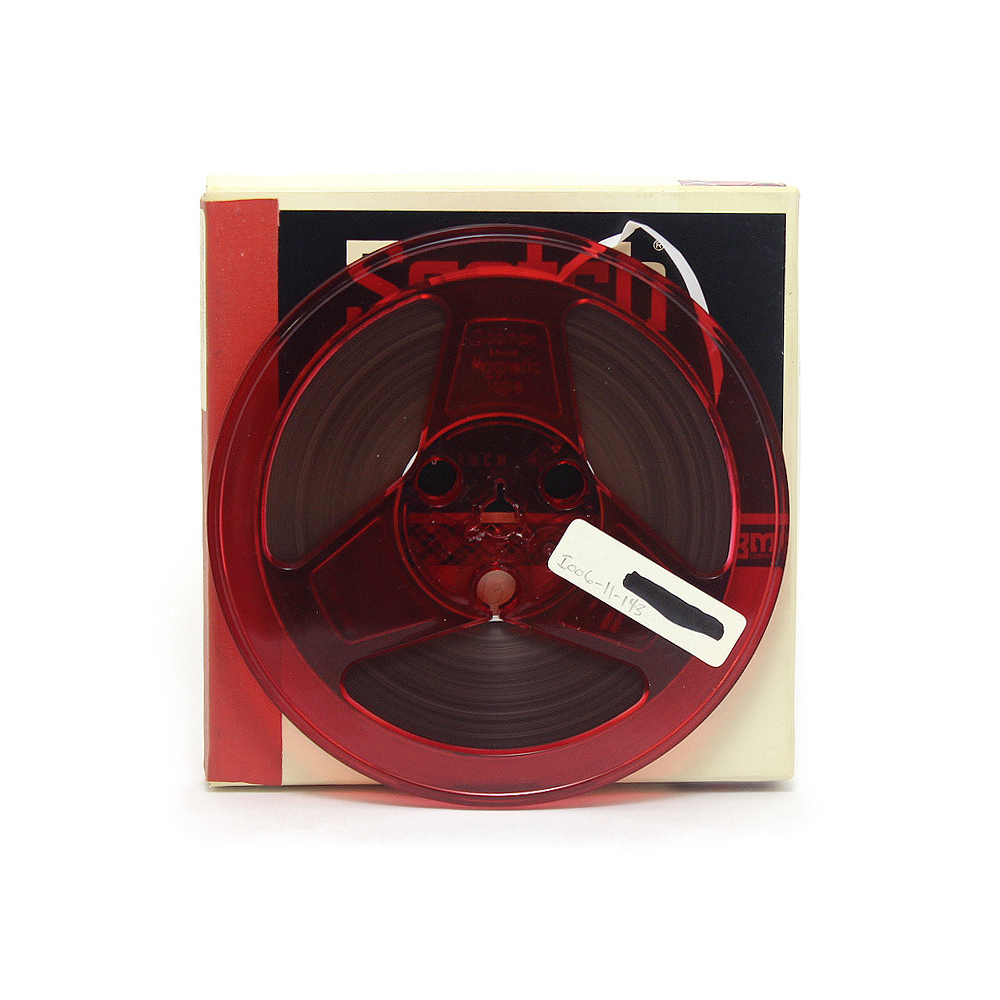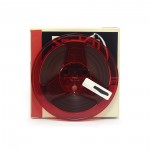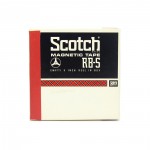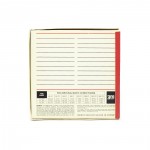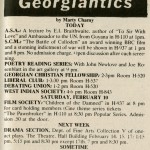Introducer - Roy Kiyooka
00:00:00.00
Well, it gives me a very special kind of pleasure to introduce John Newlove. An old and dear friend. We met in the fall of '61 in Vancouver, and both of us had come from Saskatchewan to Vancouver. I think that some of John's most memorable early poems have to do with the fact of Saskatchewan. It's perhaps not an exaggeration to say that the place does continue to haunt him, and hopefully that the exorcism is not complete and that we may get some more Saskatchewan poems. Subsequently, and this is still in Vancouver, we shared a studio, or rather, he shared my studio [Laughter], for a period of little over a year. Now during this time, we played marathon games of chess, ate several hundred dozens of chocolate-coated Long Johns, scribbled poems, dribbled paint, drank cheap red wine...and read through at least a dozen five-foot shelves of great and lesser works of literature, not to mention the confusion of mice, drunken poets, women, painters, and assorted kooks who kept visiting us. Now, it was during this period that his first book, called Grave Sirs was printed, and I have in italics here "more or less." If you want to know the history of that book, you can ask John. I think there must be fifty odd copies that are still unbound someplace. This was printed by Robert Reed. It was followed by a second, called Elephants, Mothers, and Others, done by Tak Tanabe, again in Vancouver, and subsequent to that, it was rumored that Robert Columbo had discovered John Newlove for Canadian poetry [Laughter], when he collected some of his works together in an anthology called Poetry '64. Now. Following this, of course, Contact Press bought out his book, Moving in Alone, which was perhaps the book that brought him his first large-scale critical attention. Meanwhile, of course, I'd come here, and some time afterwards I received a book, a wee book, called...let's see. [Laughter] Can't read my own printing here. What They Say. Yes, What They Say is a wee book of poems, it's made up of the rejects from his manuscript that he submitted to McClelland and Stewart. McClelland and Stewart is to bring out his next book of poems called Black Night Window, when they get around to doing it. The manuscript has been in their hands for over twenty-four months. There has been much other activity which include three, two years and a third one coming up as poet in residence at Deep Springs in California. I want to conclude this little preamble by saying that at the time that John moved out of our studio, I took over this room that he slept in and wrote poetry in. The mattress in this room was about sixteen inches from the floor, and on two sides, on the wall, there was copious scribbling. Most of it were quotations from Heraclitus that he was reading at that time.
Annotation
00:04:43.90
Applause from audience.
John Newlove
00:04:51.50
They weren't quotations from whoever, whatever Greek name that was you just made up [Laughter], they were from Herodotus. And, Roy might have mentioned that, while I suppose technically you could say I was sharing the studio, I was paying half the rent. Almost half the rent. I was paying some rent. [Laughter] And he never mentioned who won most of the chess games. I write a lot of...who's throwing things at me? You didn't win any chess games. [Laughter] And you weren't paying any rent, either. I write a lot of poems about dreams, one night I woke up with a dream about an Australian chief and I managed to write down most of it. It's called "The Almost King."
Annotation
00:05:42.16
Reads "The Almost King"
Annotation
00:06:38.90
Laughter follows the line, "And confuses him into a state of culture."
John Newlove
00:08:32.00
Well, when you have dreams like that, you don't really have much chance. I've a number of short poems, I'm told it's not good to give them at poetry readings because people don't listen fast enough or something. But. [Laughter] This...Yes, that ashtray is stolen from the faculty club, George, and your wife stole it. [Laughter] This one is called "The Candle."
Annotation
00:09:07.18
Reads "The Candle"
John Newlove
00:09:19.78
Again a dream. This poem, misprinted in the Malahat Review, is one that I most like. It's called "The Engine in the Sea."
Annotation
00:09:32.74
Reads "The Engine in the Sea"
John Newlove
00:11:26.30
Love poems about sleep. And about dreams. This one is called "Before Sleep." I used to have a great deal of trouble going to sleep because I was afraid I would have nightmares.
Annotation
00:11:44.25
Reads "Before Sleep"
John Newlove
00:12:53.64
And again another one about dreams, this one called "The Dream Man. Dreamed I once wrote a dream about somebody else's dream, but that's not fair, dreams are copyright. This was my own. [Laughter]
Annotation
00:13:09.84
Reads "The Dream Man"
John Newlove
00:14:35.19
According to the rules, you're supposed to say things in between poems, but I can't really ever think of anything appropriate to say in between them, so. I used to have some nice Ed Sullivan routines, but I've forgotten them. This poem is called "Burn."
Annotation
00:14:52.92
Reads "Burn"
John Newlove
00:15:16.78
And this one, an old one, again fairly short. It's called "No Song."
Annotation
00:15:25.98
Reads "No Song"
John Newlove
00:15:47.94
I have a poem I wrote for and about a friend, but after the poem was finished as you may see, I showed it to him but I didn't tell him it was about him. He said it was a very good poem and very accurate, and so on. But he didn't know it was about himself. It's called, "What do you want, what do you want?"
Annotation
00:16:06.01
Reads "What do you want, what do you want?"
Annotation
00:16:51.53
Laughter and applause follow the line, "I want a lover who suffers indignities."
John Newlove
00:17:01.19
After he said it was such an accurate poem, I couldn't tell him it was about him. This one's called "Strand by Strand."
Annotation
00:17:14.01
Reads "Strand by Strand"
John Newlove
00:17:56.13
This is the first time I've kept to a list of...because usually I decide that I don't want to read a particular poem and I get all confused, but I'm very pleased with myself when I keep right to the schedule. Everything organized, everything complete. This short poem in five naturally short pieces is called "One Day."
Annotation
00:18:23.34
Reads "One Day"
John Newlove
00:18:55.94
Charles Williams died in about 1953, he was an Englishman, originally Cockney. He wrote a number of what I think are very good poems, a number of detective novels, some theological deputation, I guess would be the right word. One of his detective novels is about finding the holy grail. It's called War in Heaven and it's out in Faber Paperback, go and buy it, it's really nice. This poem is for and from and about Charles Williams.
Annotation
00:19:35.08
Reads “For and From Charles Williams”.
John Newlove
00:20:04.70
Now my list has gone to pot, because I've got a poem down in a magazine that I didn't bring. So. One day some years ago, I was hitchhiking out to British Columbia. I got to a place called Golden, B.C. and I had to go up the Big Bend Highway, this would be before the Rogers Pass was open. And I got a ride about thirty miles in on what I didn't know was an illegally-present logging truck, because the Big Bend Highway was not open to traffic for three more days. So I sat three days on the Big Bend Highway. This poem roughly...well, it's called "Solitaire."
Annotation
00:20:47.52
Reads "Solitaire"
John Newlove
00:21:22.54
This short one called "El Paso" because El Paso was the place where it happens. It was ninety degrees outside in El Paso, and with the air conditioning, which I couldn't turn off, it was about thirty below. And I couldn't sleep, I had to get up in the middle of the night and get dressed and get under the blankets, and I caught terrible cold in that motel.
Annotation
00:21:41.65
Reads "El Paso"
John Newlove
00:21:56.82
Since I've been out of Nova Scotia, I've written a couple of poems about or around Nova Scotia. The main thing I can't seem to get in a poem just yet is the difference between the Pacific Ocean, in Vancouver, and the Atlantic. There seems a tremendous difference that I can feel but that I can't seem yet to grasp in the fact. This poem is called "God Bless You."
Annotation
00:22:24.58
Reads "God Bless You"
Annotation
00:22:43.58
Laughter follows the last line, "God bless you if you go in a bathing suit to hell."
John Newlove
00:22:47.41
The next piece is on the back of my list. I think this is about the only other ethnic Nova Scotia-type poem that I've got, but I was only there for about six months and I can't quite put out a book yet. This is called "By the Grey Atlantic."
Annotation
00:23:04.96
Reads "By the Grey Atlantic"
John Newlove
00:23:31.34
I think I'll read quickly a number of poems from this book. I'm anxious not to keep you too long, if anybody feels like walking out, I won't really be insulted if you'll [inaudible.] These are all quite simple so I might as well just give the title in my school-class fashion and then go on to read them. This is called "The Photograph my Mother Keeps." I might see first that Verrigan is a town in Saskatchewan named after a leader of the Doukhabors, they first came to that area after Peter the Lordly Verrigan [inaudible] his palace, which is really just a gigantic farmhouse, it's outside the town.
Annotation
00:24:19.40
Reads "The Photograph my Mother Keeps"
John Newlove
00:25:04.78
This one, about a pregnant girl, it's called "On Her Long Bed of Night."
Annotation
00:25:09.63
Reads "On Her Long Bed of Night"
John Newlove
00:26:12.25
So, this one's about my father. Drowning kittens, in a lot of houses in Saskatchewan you keep a rain barrel on a corner of the house underneath a spout to get the fresh rainwater for washing and so on.
Annotation
00:26:27.09
Reads “My Daddy Drowned”.
Annotation
00:27:09.11
Laughter and applause follow the last line, "Because sometimes I lot those women slip to the surface and squeak a little bit before I kill them."
John Newlove
00:27:18.80
This one is called "Half in Love."
Annotation
00:27:22.77
Reads "Half in Love"
John Newlove
00:28:02.19
This one is called "Sister Cowen." She used to run a mission in Edmonton, and she had very good stew. She was a very violent woman. On Christmas Eve she used to give all the bums fifty cents, but she gave a particularly long sermon on Christmas Eve. She was very down on booze.
Annotation
00:28:25.73
Reads "Sister Cowen"
Annotation
00:28:40.67
Laughter follows the last line, "She handed each man and his partner half the price of a bottle of wine."
John Newlove
00:28:49.73
This one is set in Vancouver outside Roy Kiyooka's studio.
Annotation
00:28:58.04
Reads unknown poem, first line "The obnoxiously-generated neon suspense".
John Newlove
00:29:30.53
The name of this book is Elephants, Mothers, and Others. I've read poems about others and one about my mother, and this is the elephants poem.
Annotation
00:29:41.05
Reads “Elephants”
Annotation
00:29:49.95
Laughter follows the line "unless one of them tries to crawl up my leg."
John Newlove
00:30:01.45
I think I've gone on too long, there is a longish poem called "The Fat Man," which I want to read, so I'll skip the rest of the stuff I thought I was going to read and just do this one.
Annotation
00:30:18.67
Reads "The Fat Man"
Annotation
00:34:47.63
Applause begins prematurely.
John Newlove
00:34:48.91
It's not finished, you see, it's not...[Laughter]
Annotation
00:34:52.09
Continues reading "The Fat Man"
John Newlove
00:36:33.45
Thank you.
Annotation
00:36:35.23
Applause concludes the reading.
Annotation
00:36:55.23
Recording ends.
